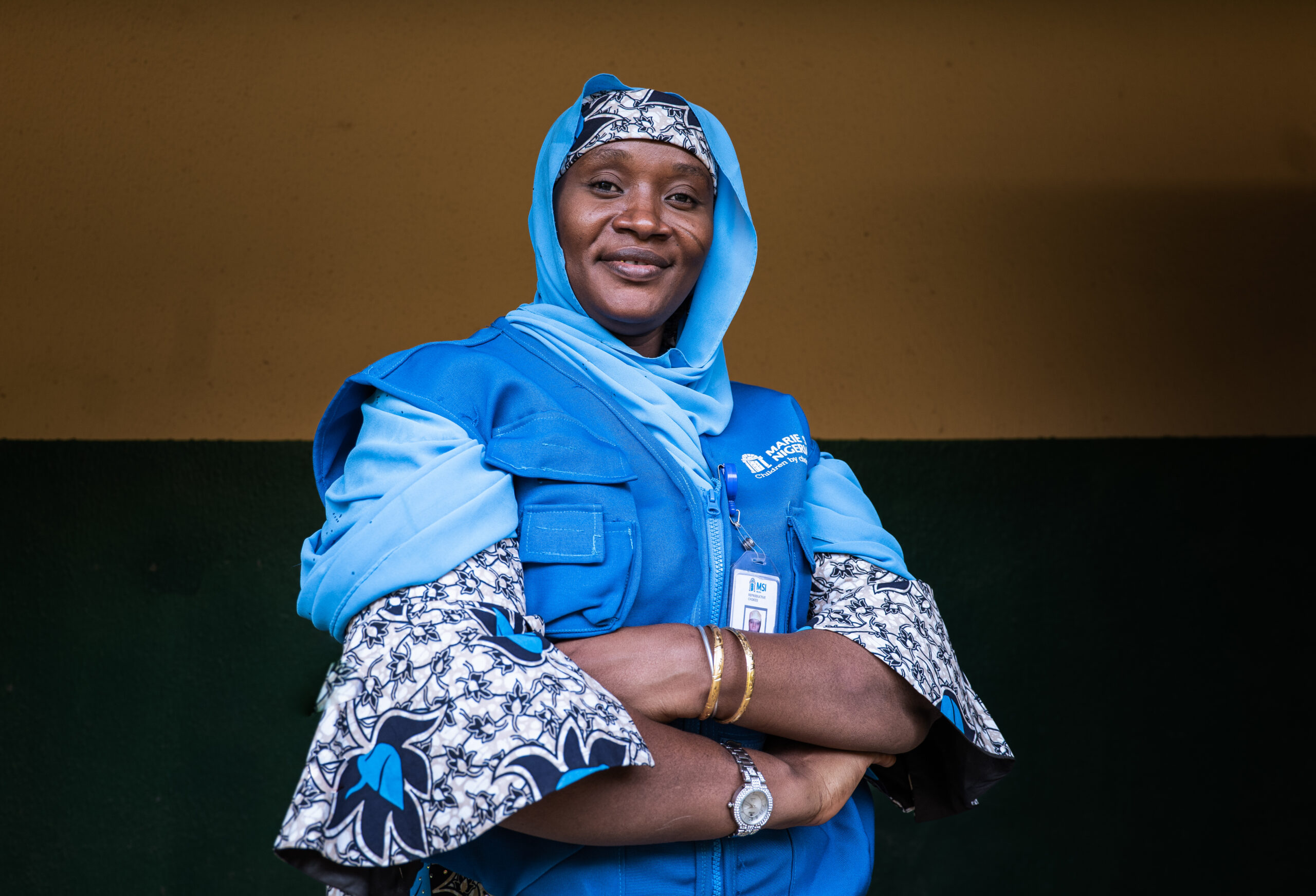The leading sexual health charity’s on-going campaign - #SmashAbortionStigma - aims to break the harmful wall of silence around abortion
- New research reveals that 90%[i] of UK adults believe women should be able to access abortion services in the UK – much higher than previous estimates[ii].
- The increase in support for pro-choice views follows several high-profile reproductive rights battles including the Irish abortion referendum, abortion law reform in Northern Ireland and on-going abortion rights challenges in the U.S.
- Men and women’s attitudes towards abortion are similar, with 88%[iii] of men believing women should be able to access abortion care compared to 91%[iv] of women.
- Adults become progressively more pro-choice as they age, with 82%[v] of 18-24 year olds believing UK women should have access to abortion care compared with 92%[vi] of over 65s.
- But just over a third (34%)[vii] of men feel uninformed about the topic of abortion in general.
- And more than 4 in 10 (42%)[viii] of men would like more information on abortion to be made available to them.
- MSI is calling on people to break the silence around abortion with its campaign #SmashAbortionStigma.
- The campaign aims to amplify support that exists for women and choice, reduce stigma around abortion and increase access to information and support in the face of an increasing anti-choice presence and the beginning of the 40 Days for Life campaign.
9 in 10 (90%)[ix] UK adults now believe women should be able to access abortion services in the UK, leading global sexual and reproductive healthcare charity, MSI Reproductive Choices, has revealed.
The new figures, commissioned by MSI Reproductive Choices and calculated by leading pollsters, YouGov, are significantly higher than a previous estimate of attitudes to abortion in the UK, ran by NatCen in 2017, which put public support at 70%[x] if a woman wanted to end a pregnancy.
Interestingly, men and women’s attitudes towards abortion are similar, with 88%[xi] of men believing women should be able to access abortion care compared to 91%[xii] of women.
The study also shows adults becoming progressively more pro-choice as they age, with 82%[xiii] of 18-24 year olds believing UK women should have access to abortion care compared with 90%[xiv] of 25-49 year olds and 92%[xv] of over 65s.
The research confirms across-the-board support for pro-choice legislation in the UK where a continuous shift in public attitudes follows several high-profile reproductive rights battles including the Irish abortion referendum, abortion law reform in Northern Ireland and on-going abortion rights challenges in the U.S.
The charity believes that undue weight given to the anti-choice movement perpetuates the shame, stigma and silence associated with abortion.
This is despite the fact that more than three quarters (79%)[xvi] of women want to talk more about abortion to help women feel more supported (76%)[xvii] and to increase understanding around abortion (75%)[xviii].
Katriana Ciccotto, 25 from London, had an abortion:
“Finding out I was pregnant was a huge shock and really unexpected as I was using contraception. At the sexual health clinic, the nurse I saw had a crucifix round her neck and made no eye contact with me at all. She made me feel extremely guilty, like I was a bad person.
“I knew I wanted an abortion but interestingly, although I am pro-choice, I had a subconscious negative view of women who access abortion services.
“I was googling stories about abortion, looking on YouTube, but there was nothing I could relate to. I know if I had been able to find stories about other women, I would have felt less alone.
“The lady I eventually spoke to at the Marie Stopes Clinic was so patient and gave me time to speak. It felt like she understood me, and I felt like a person rather than a number. I felt like I had options.
“My sexual partner at the time was supportive at first but the closer I got to the date of the procedure, the less supportive he got – that was a really hard pill to swallow and made the experience more difficult. I felt let down and thought maybe he thought badly of me.”
Following previous research from the leading NGO around women’s views on abortion, the study also took a deeper look at male attitudes, finding men to be overwhelmingly supportive of their sexual partners decisions.
91%[xix] of men think it’s important to provide emotional support if their sexual partner was considering an abortion, 82%[xx] of men think it’s important to accompany a sexual partner to appointments or sessions and 81%[xxi] of men think it’s important to seek information or advice about abortion for their partner.
But, while 41%[xxii] of men are happy with the current level of information about abortion available to them, just over a third of men (34%)[xxiii] feel uninformed about the topic of abortion in general and more than 4 in 10 (42%)[xxiv] of men would like more information about abortion to be made available.
Steffan, 25, was Katriana’s sexual partner:
“When I found out Katriana was pregnant, I was scared. Firstly, I was shocked as she was using contraception, then I was worried about how she was mentally and physically.
“We both felt like an abortion was the right thing to do, but although I’ve always been pro-choice, looking back I didn’t really know anything about abortion. It wasn’t something I’d talked about and I didn’t know of anyone who had been through one. I didn’t want to tell my friends or my parents, so I only told my brother.
“We talked on the phone and met up before the appointment happened, but after she’d had the abortion, I felt like I’d fulfilled my role. I don’t think I had a real awareness of the situation because I didn’t attend the appointments, and if you aren’t there, you feel removed from the situation.
“I know Katriana felt like I didn’t support her fully during the abortion, and in hindsight I would have been there for her more, before and after.”
Through its campaign – #SmashAbortionStigma – MSI Reproductive Choices is addressing the need for open conversations about abortion by calling on people to break the silence around abortion.
The campaign aims to amplify across-the-board support that exists for women and choice both in the UK and worldwide, reduce stigma around abortion and increase access to information and support in the face of an increasing anti-choice presence and the beginning of the 40 Days for Life campaign. It also hopes to encourage male support in the pro-choice movement.
MSI Reproductive Choices has updated its online resources for partners, family and friends to help them feel equipped and confident whilst supporting someone through an abortion experience.
Jonathan Lord, Medical Director for MSI UK said:
“The UK is overwhelmingly pro-choice, yet in public debate, anti-choice views are often given equal weighting. This leaves women feeling judged and stigmatised and both men and women shamed into silence about their opinions, experiences and understanding of abortion.
“We hear from women who attend appointments alone because they are too frightened to tell their sexual partner, and men who need more knowledge and tools to support their sexual partner fully.
“Our research shows that open and honest conversations about abortion help both women and men feel informed, educated and supported when it comes to making or supporting choices around pregnancy and by breaking down the harmful wall of silence, we can continue to smash abortion stigma and champion the right of women to access abortion care.”
Join the movement to #SmashAbortionStigma on social media or read more about the campaign here: #SmashAbortionStigma
– Ends –
Notes to Editors
For interviews and further information please contact:
Email: [email protected]
Tel: +44 (0)20 7034 2377/ +44(0)20 3219 8245 or +44(0)7769 166 516 (out of hours)
[i] All figures unless otherwise stated are from YouGov Plc. Total sample size was 5098 UK adults (18+). Fieldwork was undertaken between 6th-9th January 2020. The survey was carried out online. Respondents were asked: In general, do you think women should or should not be able to access abortion services in the UK?
[ii] NatCen. 2017. British Attitudes to Abortion. NatCen. Viewed 4th February 2020. < https://www.natcen.ac.uk/blog/british-attitudes-to-abortion>
[iii] YouGov Plc. (2020) Total sample size was 5098 UK adults (18+). Respondents were asked: In general, do you think women should or should not be able to access abortion services in the UK?
[iv] Ibid
[v] Ibid
[vi] Ibid
[vii] YouGov Plc. (2020). Total sample size was 1956 UK Men (18+). Respondents were asked: How informed, if at all, do you feel on the topic of abortion in general?
[viii] YouGov Plc. (2020). Total sample size was 1956 UK Men (18+). Respondents were asked: Thinking about the topic of abortion in general, would you like more or less information to be made available, or is the current level about right?
[ix] Ibid
[x] NatCen. 2017. British Attitudes to Abortion. NatCen. Viewed 4th February 2020. <https://www.natcen.ac.uk/blog/british-attitudes-to-abortion>
[xi] YouGov Plc. (2020). Total sample size was 5098 UK adults (18+). Respondents were asked: In general, do you think women should or should not be able to access abortion services in the UK?
[xii] Ibid
[xiii] Ibid
[xiv] Ibid
[xv] Ibid
[xvi] YouGov Plc. (2019) Total sample size was 2,684 women (18+). Respondents were asked: Thinking about the topic of abortions in general, do you think it should or should not be talked about more openly?
[xvii] YouGov Plc. (2019) Total sample size was 2,684 women (18+). Respondents were asked: You said abortions should be talked about more openly, why do you think this? (Please tick all that apply)
[xviii] Ibid
[xix] All figures, unless otherwise stated, are from YouGov Plc. Total sample size was 1956 UK Men (18+). Fieldwork was undertaken between 6th -9th January 2020. The survey was carried out online. Respondents were asked: Thinking about a scenario where a sexual partner was considering getting an abortion, how important, if at all, is it for men to provide emotional support
[xx] YouGov Plc. (2020). Total sample size was 1956 UK Men (18+). Respondents were asked: Thinking about a scenario where a sexual partner was considering getting an abortion, how important, if at all, is it for men to accompany a sexual partner to appointments or sessions
[xxi] YouGov Plc. (2020). Total sample size was 1956 UK Men (18+). Respondents were asked: Thinking about a scenario where a sexual partner was considering getting an abortion, how important, if at all, is it for men to seek information or advice about abortion for their sexual partner
[xxii] YouGov Plc. (2020). Total sample size was 1956 UK Men (18+). Respondents were asked: Thinking about the topic of abortion in general, would you like more or less information to be made available, or is the current level about right?
[xxiii] YouGov Plc. (2020). Total sample size was 1956 UK Men (18+). Respondents were asked: How informed, if at all, do you feel on the topic of abortion in general?
[xxiv] YouGov Plc. (2020). Total sample size was 1956 UK Men (18+). Respondents were asked: Thinking about the topic of abortion in general, would you like more or less information to be made available, or is the current level about right?








